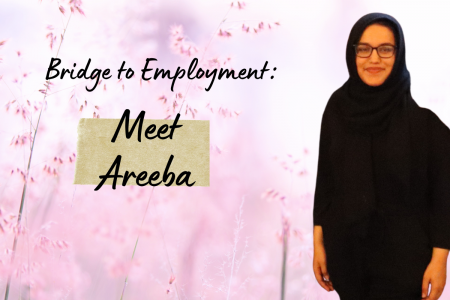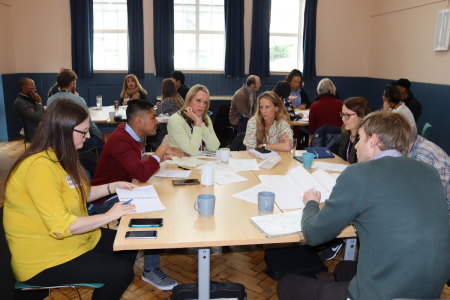
Breaking Barriers to Enable Employment and Enterprise
In our final chapter we turned to employment, perhaps the most empirical measure of integration. Nevertheless, it must be noted that employment may not be meaningful or sustainable if the factors outlined in previous chapters are not satisfied. Like all members of society, citizens-in-waiting gain and retain meaningful work if they are housed, healthy, treated fairly, and supported in their educational development.
*Key findings from our Change Makers 2023 Report.
In our interviews, when we asked participants to tell us about themselves, the first thing people would frequently mention (after where they’re from) was in what discipline they graduated…
“I graduated from political science and law”
“I graduated in communications, business and accounting”
“I was a medical student in Afghanistan and graduated after 7 years training”
“I have a bachelors in mass communication”
“I have a masters degree in English language and literature, and a bachelors in management”
“I have a TV and Film bachelors, I studied animation too”
“I studied civil engineering”
“I trained in computer security”
“My degree is in diplomacy and international relations”
“I graduated from art school in my home city”
“My oldest son was in his final year of his architecture and engineering degree”
This emphasis on prior learning signifies the importance placed on their identity as qualified, highly educated people. This revelation is soon followed by noting their previous occupations: from a film production manager, to a university lecturer, to an intelligence analyst, to a chemical engineer, to a nurse, to a glass blower, to a plumber, to a journalist, the list goes on. But despite this vast experience, citizens-in-waiting struggle to gain meaningful employment.
As discussed in the previous chapter, a significant barrier to employment is language proficiency, hampered by the long waiting lists and slow pace of ESOL progress. But beyond this, citizens-in-waiting are disadvantaged by the lack of accreditation for their prior learning and experience. Qualifications are scarcely recognised and references are unobtainable due to the circumstances of displacement. Subsequently, many participants complained that the only work the Job Centre offers are low-waged, anti-social jobs such as warehouse work or housekeeping.
Consequently, many opt to retrain and start their own business, and frequently, become employers themselves. To meet this trend, ACH has been integral in securing partnerships across disciplines and sectors to train and support citizens-in-waiting in their business journeys, with a catalogue of success stories to date. This entrepreneurial zeal is a testament to the ambition and drive of citizens-in-waiting which must be celebrated. However, qualified workers are too often pushed into self-employment due to lack of opportunity in the waged sector as a result of discrimination, slow pace of ESOL progress, and crucially - lack of accreditation of previous certified and experiential learning. Rather than seeing citizens-in-waiting as ‘blank slates’, the labour market would benefit from capitalising on their abundance of existing skills and experience.
Since the Covid pandemic, the UK has seen a loss of 600,000 workers and 9 million people between the ages of 16 and 64 are now outside the labour market altogether (Partington 2022). To combat this, the Government has announced in its latest Spring Budget (2023) they will provide free childcare, increase support for benefit claimants, close the disability gap, support older workers to return to work, and increase the provision of education and skills. But little attention is paid to the hundreds of thousands of citizens-in-waiting, including the backlog of 160,000 asylum seekers marooned in statutory unemployment. This lost talent would be welcomed in sectors such as health and social care, IT and software, engineering, and education which suffer increasing labour shortages.
Did you Know…
- “Asylum migrants are more likely to be in self-employment than the UK-born and close to 24% of the asylum migrants in self-employment have employees, compared with 18% of the UK-born” (Vargas-Silva 2019: 3).
- The UK’s Ethnic Minority Businesses make a significant economic contribution. An estimated 250,000 ethnic minority-led firms contribute around £25bn per annum to the UK economy and are more likely than non-EMBs to engage in various forms of innovation (CREME 2022: 6).
- 406 citizens-in-waiting were supported by the ACH Migrant Business Support Project in 2022 and 811 citizens-in-waiting were supported with career advice in Bristol through the ACH National Careers Service contract.
Barriers
- Unrealistic eligibility criteria: Entry-level jobs usually ask for at least a level 2 grade of English, if not level 3. For many roles this is an unnecessary standard and only serves to keep citizens-in-waiting out of the workforce. Given the opportunity, citizens-in-waiting will learn on the job and develop their English skills at work.
- Anti-Social employment: Warehouse jobs, night time jobs, housekeeping, and other back-of-house work may be suitable for some, but often restrict citizens-in-waiting to the margins of social life and provide little opportunity to improve their language.
- Exploitative employment: With little understanding of their rights in the UK, citizens-in-waiting are frequently exploited, working below minimum wage in unsafe conditions.
- Tokenistic employment: Employers hiring citizens-in-waiting to meet corporate social responsibility targets leads to poor retention of meaningful and increased precarity.
- DBS: Many fail DBS checks because of a lack of address and references. This is particularly an issue in the health and social care sector.
- Accessibility: Many citizens-in-waiting struggle to look for work without a home computer or laptop. On top of this, job applications can be difficult to navigate.
- Lack of recognition for prior experience or qualifications: Lost potential.
Enablers
- APL (Accreditation of Prior Learning - both certified and experiential).
- Partnerships such as the Refugee Employment Network.
- Personalised career advice & tailored business support.
- Integration of working and learning.
- Equality of opportunity – levelling the playing field.
- Intensive ESOL courses.
- Routes to skills-shortage sectors such as health and social care.
Recommendations for Action
- DBS outcomes to be challenged – Brunel Care have begun challenging DBS decisions rather than accepting them, with positive outcomes. They argue that hotel addresses must be accepted, and employment references must take displacement into account.
- Personalised recruitment processes – So that citizens-in-waiting don’t fall through the cracks of eligibility criteria which don’t apply to them.
- The adoption of ‘buddy’ roles in workplaces – To combat discrimination and support professional development.
- Resilience as an asset – To prioritise the characteristic of resilience over criteria such as Level 3 English.
- The use of APL (Accreditation of Prior Learning), both certified and experiential, in all educational institutions in Bristol and the West of England, so that citizens-in-waiting may be recognised for their existing skills and abilities rather than be forced to retrain.


